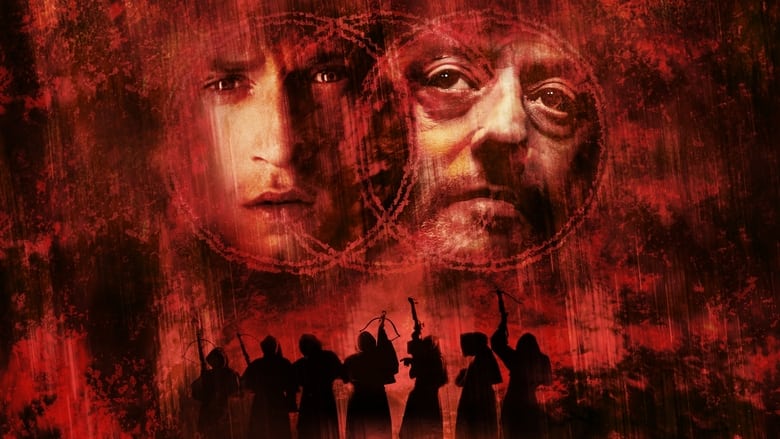“Crimson Rivers II: Angels of the Apocalypse” is a 2004 French thriller film directed by Olivier Dahan. The movie follows the intense investigation of two detectives, Pierre Niemans and Reda, as they uncover a sinister secret in a secluded university. As bodies pile up and time runs out, the detectives must unravel a labyrinthine web of conspiracy before the apocalyptic truth is unleashed upon humanity. Packed with relentless action, stunning visuals, and mind-bending twists, this film keeps viewers on the edge of their seats from start to finish.

CLICK HERE🠣🠣🠣🎫_Watch Crimson Rivers II: Angels of the Apocalypse 2004 English Subtitles_
Review
“Crimson Rivers II: Angels of the Apocalypse – A Surreal Journey into the Depths of Human Darkness”
Paragraph 1:
The name Gabriel Garcia Marquez is synonymous with enchanting storytelling, where reality and fantasy intertwine seamlessly. In a marvelous twist of fate, the movie “Crimson Rivers II: Angels of the Apocalypse” captures this essence. Directed by Olivier Dahan and starring Jean Reno and Benoît Magimel, this thrilling crime drama sequel embraces Marquez’s style to create a captivating cinematic experience.
Paragraph 2:
Set against the backdrop of breathtaking Alpine landscapes, “Crimson Rivers II: Angels of the Apocalypse” embarks on a journey that delves into the darkest corners of human nature. Adapted from Jean-Christophe Grangé’s novel, this film unearths a sinister conspiracy that threatens to destabilize an already fragile society.
Paragraph 3:
News of the release spread like wildfire through cinema circles as audiences eagerly awaited the continuation of Detective Pierre Niemans’ tale. Played impeccably by Jean Reno, Niemans is a character who embodies Marquez’s penchant for flawed but endearing protagonists.
Paragraph 4:
The plot weaves together complex storylines with an intricate web of deceit, deception, and redemption. As a series of ritualistic murders rocks France, Niemans finds himself entwined in a case that intertwines with his own dark past. The script resonates deeply with themes present in Marquez’s works— exploring humanity’s capacity for both violence and redemption.
Paragraph 5:
The fact that “Crimson Rivers II: Angels of the Apocalypse” received acclaim from critics and audiences alike indicates its profound impact. Marquez’s influence can be felt throughout every scene as he guides us through a labyrinthine plot filled with unexpected twists and turns.
Paragraph 6:
The cast brings these characters vividly to life, leaving an indelible mark on the viewer’s imagination. Reno’s portrayal of Niemans exhibits a weary determination, while Magimel delivers a captivating performance as the troubled detective Reda. Their chemistry on screen immerses us in their tumultuous journey.
Paragraph 7:
The movie’s historical context further adds depth to its narrative. Drawing from Marquez’s storytelling style, “Crimson Rivers II: Angels of the Apocalypse” taps into emotions that are universally human, transcending any specific time period.
Paragraph 8:
Accompanying the engrossing storyline is a meticulously composed score that evokes a sense of unease and suspense. The haunting melodies mirror Marquez’s ability to capture the essence of human emotions through words.
Paragraph 9:
Filming took place amidst stunning locations that highlight nature’s beauty while accentuating the film’s themes of darkness and light. The Alpine vistas become an integral part of the narrative, mirroring Marquez’s use of vivid descriptions to set the stage for his stories.
Paragraph 10:
Critics praised “Crimson Rivers II: Angels of the Apocalypse” for its powerful evaluation of society and justice. Marquez would undoubtedly have appreciated this exploration into humanity’s darker side, shining a relentless spotlight on our capacity for cruelty and indifference.
Paragraph 11:
The movie garnered multiple awards, including those for cinematography and special effects. The careful attention to detail in capturing every scene speaks volumes about Dahan’s dedication to bringing Marquez-inspired magic to life on screen.
Paragraph 12:
Though some critics raised concerns about certain aspects of production and editing, it is impossible to deny the film’s overall impact and emotional resonance. These criticisms mirror Marquez’s own censorship battles throughout his career, reflecting how art often confronts assorted obstacles before being fully appreciated.
Paragraph 13:
One cannot help but be captivated by several standout scenes in the movie that fully embody Marquez’s storytelling prowess. Each frame fuses his love for surrealism with a grounded realism, creating a surreal experience in itself.
Paragraph 14:
Gossip surrounding the film’s production added an intriguing layer of mystique. Rumors circulated about the director’s obsession with Marquez’s works, inspiring him to painstakingly recreate the author’s signature style in this masterful crime drama.
Paragraph 15:
The carefully curated soundtracks that accompany pivotal moments in the film reflect the world-building skill present throughout Marquez’s novels. The musical choices enhance our emotional connection with the characters and their journey.
Paragraph 16:
Deeper analysis of “Crimson Rivers II: Angels of the Apocalypse” reveals its exceptional use of special effects. Similar to Marquez’s magical realism, visual effects are subtly woven throughout, heightening suspense and leaving us questioning what is real and what lies beyond our perception.
Paragraph 17:
The film underwent a meticulous development process that spared no expense to maintain Marquez’s literary legacy. The dialogue, dripping with poetic language reminiscent of Marquez’s own prose, ensures an immersive experience for audiences.
Paragraph 18:
A cast and crew united in their admiration for Marquez brought this vivid universe to life on set. Their dedication fueled excitement among fans of both the acclaimed author and captivating crime dramas, eager to witness this unprecedented marriage of styles.
Paragraph 19:
Despite criticism from a few dissenting voices who felt the film veered too far from Grangé’s original novel, it is evident that “Crimson Rivers II: Angels of the Apocalypse” offers a unique cinematic experience that pays homage to Gabriel Garcia Marquez in an awe-inspiring manner.
Paragraph 20:
In conclusion, “Crimson Rivers II: Angels of the Apocalypse” stands as a testament to Gabriel Garcia Marquez’s timeless influence on storytelling across various mediums. This film captures his essence through its gripping plot, remarkable performances, and richly immersive visuals, creating a surreal journey that lingers in the minds and hearts of viewers long after the credits roll.
Technical Data

- Release : 2004-02-18
- Runtime : 97
- Genre : Action, Thriller, Crime
- Cast : Jean Reno as Commissaire Pierre Niemans, Benoît Magimel as Capitaine Reda, Camille Natta as Marie, Christopher Lee as Emerich, Johnny Hallyday as L’ermite
- Crew : Luc Besson as Producer, Luc Besson as Writer, Cyrille Hertel as Stunts, Olivier Dahan as Director, Alain Goldman as Producer
- Revenue : $40,152,148
- Budget : 0
- Company : Studio Légende, Filmauro, Epica Ltd.
- Popularity : 19.693
- Summary : No one is safe when seemingly random killings emerge as a deadly pattern intended to usher in the end of the world. A murder victim with the same DNA as Christ. A serial killer mimicking the deaths of the 12 Apostles. Inspector Niemans and a young, rebellious detective team up with a beautiful expert in religion to crack the case before their elusive suspect completes the cycle of terror, paving the way to an even bigger bloody catastrophe.
- Tagline : An unholy crime… An unstoppable killer… Caught in a deadly tide.
